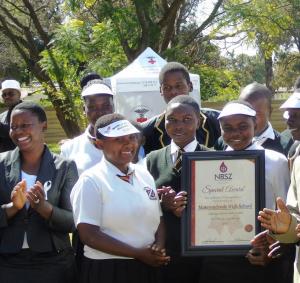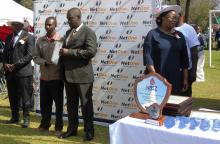Free blood for Zimbabwe’s public health institutions
The promise was made as Zimbabwe joined the rest of the world to commemorate World Blood Donor Day at a function held at Gweru Provincial Hospital. Every year on 14 June, the global community celebrates World Blood Donor Day. This year’s theme is focused on blood donation as an act of solidarity: Be there for someone else. Give blood. Share life. This draws attention to the regular and voluntary blood donors, and encourages people to care for one another by donating blood. The day is also an opportunity to thank voluntary, unpaid blood donors for their life-saving gifts of blood and to motivate people in good health who have never given blood to begin doing so, particularly young people. WHO recommends the collection of blood, plasma and other blood components from low-risk, regular, voluntary unpaid donors through the strengthening of donation systems; the phasing out of family/replacement donation; the elimination of paid donation; and effective donor management, including care and counselling.
In a statement read on his behalf, the Honorable Minister of Health and Child Care, Dr David Parirenyatwa said his Ministry will be scrapping user fees for blood accessed by public health institutions with effect from the end of June 2018. Starting July, everyone who needs blood should get it for free regardless of background and nature of disease, a move that brings relief to pregnant women and those injured in road traffic accidents. “The free blood for all move is going ahead as planned and mechanisms have already been put in place to finance the move, and come July 1, blood will be available for free,” said Dr Parirenyatwa. Government has been gradually reducing the cost of blood to ensure that it gets within reach of the ordinary person from USD150 in 2016, to the current USD50 a pint, but it still remained out of reach for most Zimbabweans.
WHO Zimbabwe Representative ai., Dr Juliet Nabyonga read the statement of the Regional Director on the occasion of World Blood Donor Day. She encouraged ordinary people to be there for someone else by giving blood and sharing life. “Adequate supplies of safe blood can only be assured through regular, voluntary, unpaid donations; and I urge countries to support voluntary blood donations as a solidarity act for all, and to ensure that national blood services have sustainable funding for blood safety programmes,” she said. Dr Moeti also thanked all voluntary blood donors and encouraged them to continue giving the valuable gift regularly to ensure sufficient blood stocks before emergencies arise; and also congratulated blood donor associations who are working to make safe blood available in healthcare facilities.
As has become the norm for all World Blood Donor Day commemorations, young blood donors from a school which donated the highest number of blood units nationally, as well as milestone blood donors who donated more than 25 units of blood in 2017 were honoured during the festivities. Muterendende High School was 2017’s winner for the best blood donation award, and received five computers and some consumables for the school as well as a plaque identifying them as the school with the highest number of blood units donated in 2017.
Transfusion of blood and blood products helps save millions of lives every year. It can help patients suffering from life-threatening conditions live longer and with a higher quality of life, and supports complex medical and surgical procedures. It also has an essential, life-saving role in maternal and child care and during the emergency response to man-made and natural disasters.





